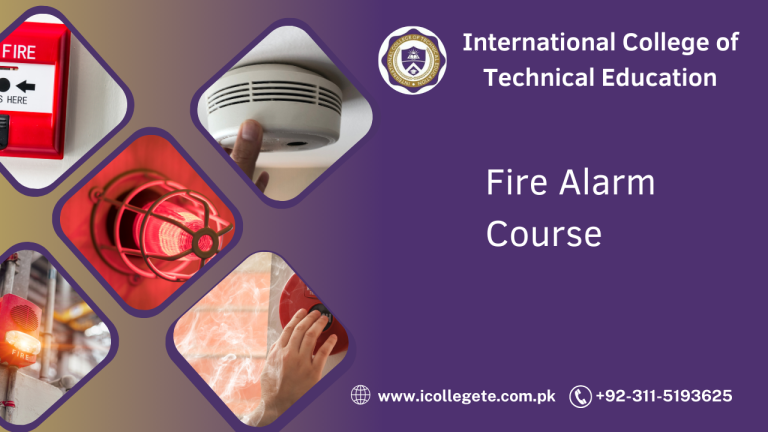The construction and civil engineering sectors are pivotal to the development of infrastructure, and maintaining high-quality standards in construction projects is crucial to ensure safety, durability, and long-term performance. This is where Quality Control (QC) in civil engineering comes into play. A Quality Control Civil Course in Faisalabad provides specialized training that equips individuals with the essential skills and knowledge to manage quality assurance and quality control processes in civil engineering projects.
The Quality Control Civil Course is designed to provide students with a deep understanding of the standards, techniques, and tools used to manage and maintain the quality of civil engineering projects. Quality control in civil engineering is a systematic process that ensures the structural integrity, safety, and longevity of buildings, bridges, roads, and other infrastructure projects. This course focuses on the methods for inspecting materials, monitoring construction processes, and ensuring compliance with regulatory standards. Students will gain hands-on experience with testing materials and conducting quality assessments to ensure that construction work adheres to the highest standards.
Course Overview
This course offers a comprehensive approach to quality control in civil engineering projects. It emphasizes both theoretical and practical knowledge, ensuring that students can confidently implement quality control systems throughout the stages of construction. The curriculum focuses on various aspects of quality management, such as material testing, construction site inspections, and adherence to national and international quality standards.
Key topics covered in the course include:
- Introduction to Quality Control in Civil Engineering: Understanding the importance of quality control in the construction industry and the role it plays in ensuring safety and durability.
- Construction Materials Testing: Learning the methods for testing construction materials like concrete, steel, soil, and aggregates to ensure they meet the required specifications.
- Quality Control Procedures: Gaining knowledge of the systematic processes involved in monitoring and controlling the quality of construction activities.
- Site Inspections and Monitoring: Understanding how to conduct effective site inspections to identify and address potential quality issues during construction.
- Quality Management Systems (QMS): Introduction to standards like ISO 9001 and their application in civil engineering projects.
- Non-Destructive Testing (NDT): Learning about advanced techniques used to assess the integrity of structures without causing damage, such as ultrasonic testing and radiography.
By the end of the course, students will be well-versed in ensuring that every phase of a civil engineering project meets the required quality standards.
Study Units
The Quality Control Civil Course typically includes the following study units:
- Introduction to Civil Engineering Quality Control
- Materials Testing and Quality Control
- Quality Control in Concrete and Steel
- Construction Site Quality Inspections
- Quality Assurance in Earthworks and Pavement Construction
- Quality Control Procedures and Documentation
- Implementation of Quality Management Systems (QMS) in Civil Engineering
- Non-Destructive Testing (NDT) Techniques
- ISO Standards and Compliance in Civil Engineering
- Case Studies and Project Management in Quality Control
These study units provide a solid foundation in both the technical and managerial aspects of quality control within the civil engineering industry.
Learning Outcomes
Upon completing the Quality Control Civil Course, students will be able to:
- Understand the fundamental principles of quality control and assurance in civil engineering projects.
- Apply various techniques for testing construction materials to ensure their compliance with required standards.
- Conduct site inspections and identify potential quality issues during the construction process.
- Implement quality management systems to monitor and improve the construction process.
- Understand the importance of adherence to industry standards and regulatory compliance in civil engineering.
- Use non-destructive testing methods to assess the quality of constructed materials and structures.
- Develop documentation and reporting procedures for quality control in civil engineering projects.
Course Benefits
- Enhanced Career Prospects: The course provides in-demand skills that are essential for professionals in the construction and civil engineering industries, improving job opportunities and career growth.
- Practical Knowledge: With a focus on hands-on experience and real-world application, students are well-prepared to handle quality control tasks on construction sites.
- Global Standards Awareness: The course educates students on international quality standards like ISO, which enhances their employability, especially in multinational companies and global projects.
- Increased Project Efficiency: By learning to manage and maintain quality control, students can contribute to reducing waste, minimizing delays, and improving overall project efficiency.
- Higher Salary Potential: As construction and civil engineering companies increasingly prioritize quality control, professionals with expertise in this field are often offered higher-paying roles.
- Certifications and Recognized Credentials: Upon completion of the course, students will often receive certifications that are recognized within the industry, adding credibility to their qualifications.
Who is This Course For?
The Quality Control Civil Course is ideal for:
- Civil Engineering Graduates: Fresh graduates looking to specialize in quality control within the civil engineering and construction industries.
- Construction Professionals: Site engineers, project managers, and supervisors who want to enhance their understanding of quality control practices.
- Quality Control Inspectors: Individuals who want to expand their skills in inspecting materials and construction processes to ensure compliance with industry standards.
- Construction Managers: Professionals responsible for overseeing construction projects who wish to ensure that the final output meets the highest quality standards.
- Entrepreneurs in the Construction Sector: Business owners in the construction industry who wish to establish or improve quality control systems within their companies.
- Quality Assurance Specialists: Individuals working in quality assurance or related fields who wish to gain a deeper understanding of quality control in civil engineering.
Future Progression for This Course
Graduates of the Quality Control Civil Course have numerous career paths and opportunities for further specialization. Some of the potential roles and future progression options include:
- Quality Control Engineer: Overseeing the quality assurance processes on construction sites, conducting inspections, and ensuring that materials meet the required specifications.
- Site Inspector: Responsible for conducting regular inspections of construction sites to ensure compliance with quality control standards.
- Construction Project Manager: Managing large construction projects, with a focus on quality control, safety, and compliance with regulations.
- Materials Testing Specialist: Specializing in testing the quality of construction materials, including concrete, steel, and soil.
- Non-Destructive Testing (NDT) Technician: Specializing in the application of non-destructive testing methods to assess the integrity of structures without causing damage.
- ISO Quality Auditor: Conducting audits to ensure that construction companies comply with international quality standards such as ISO 9001.
- Quality Assurance Manager: Overseeing the implementation of quality management systems (QMS) in construction companies to ensure that all phases of the project meet quality standards.
- Entrepreneurship in Construction: Starting your own construction or civil engineering company, with a focus on high-quality standards and quality control systems.
Additionally, individuals who complete this course can pursue further certifications in specialized areas like Six Sigma, Lean Construction, or advanced non-destructive testing, which will further enhance their skills and career opportunities.
The Quality Control Civil Course in Faisalabad is a fantastic opportunity for those looking to advance their career in the construction and civil engineering industries. With a comprehensive curriculum that covers essential quality control practices, standards, and testing techniques, this course provides the foundation for building a successful career in a highly competitive industry. Whether you’re a fresh graduate or a professional looking to enhance your skills, this course will help you become a valuable asset to any construction project. The demand for skilled quality control professionals is on the rise, and with the right qualifications, the possibilities for career growth are endless.







